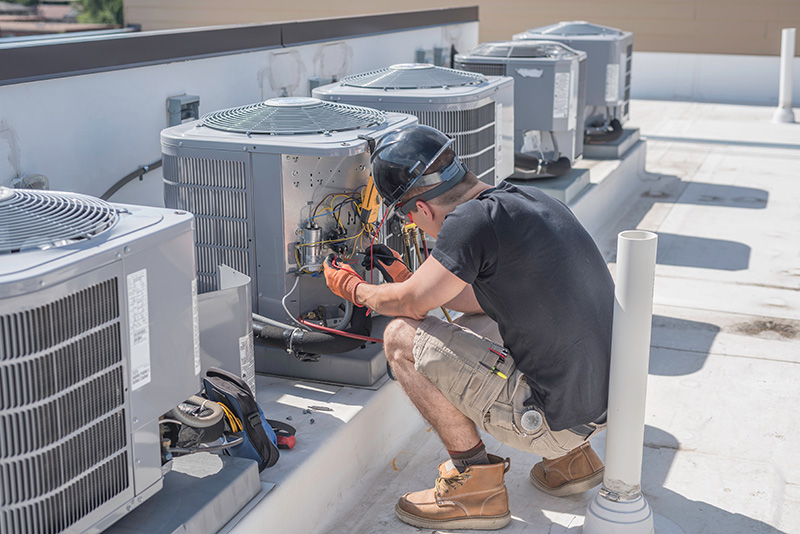Energy-Efficient Heating And Cooling Equipments to Minimize Utility Bills
As power costs proceed to increase, the relevance of energy-efficient a/c systems ends up being progressively obvious. These systems not just assure significant financial savings on utility costs yet likewise contribute to a much more lasting future by lessening energy usage. With different options offered, including geothermal warmth pumps and ductless mini-splits, homeowner face a multitude of choices that can boost comfort and air high quality. Recognizing the key attributes and maintenance demands is important to taking full advantage of these benefits. What aspects should be prioritized when selecting the right system for your demands?
Benefits of Energy-Efficient Cooling And Heating Solutions
Energy-efficient Heating and cooling systems use various advantages that prolong beyond simple cost savings. By eating much less energy, these systems add to decrease greenhouse gas exhausts, aiding to fight climate change and promote sustainability.
In addition, energy-efficient HVAC systems usually provide boosted convenience degrees. A lot of these systems feature advanced technology that permits much better temperature level control and enhanced air high quality (DMAKS HVAC). This brings about a much healthier interior setting, which is particularly vital for individuals with allergies or respiratory concerns
In addition, investing in energy-efficient cooling and heating systems can enhance residential or commercial property value. As more consumers prioritize energy effectiveness, homes and buildings furnished with these systems may attract greater bids in the real estate market.
Kinds Of Energy-Efficient HVAC Options
How can house owners and organizations pick the most ideal energy-efficient HVAC choices for their requirements? The market offers a variety of energy-efficient a/c systems, each developed to enhance comfort while reducing power intake.
One choice is the variable cooling agent flow (VRF) system, which effectively regulates the temperature in multiple areas within a structure. This system adjusts its cooling agent circulation to match the preferred temperature, resulting in significant energy cost savings.
One more preferred choice is geothermal heatpump, which utilize the planet's stable temperature level to warmth and awesome spaces. By moving warm to and from the ground, these systems show impressive efficiency, particularly in moderate environments.
In addition, ductless mini-split systems provide an energy-efficient alternative for homes doing not have ductwork. These systems enable zone-specific heating & cooling, minimizing energy waste in vacant locations.
Last but not least, high-efficiency heating systems and ac system, with advanced SEER and AFUE rankings, offer reputable environment control while taking in much less energy than traditional models. By examining these options, property owners and services can select an a/c system customized to their particular needs and power efficiency objectives.
Trick Functions to Take Into Consideration

Following, investigate the sort of compressor utilized in the system. DMAKS HVAC. Variable-speed compressors can adjust their result to match the heating or cooling demand, leading to improved comfort and energy financial savings compared to single-speed designs. Additionally, look for systems outfitted with clever thermostats that provide programmable setups and remote access, enabling for far better control over energy consumption
One more essential feature is the system's air filtration capacity. High-efficiency filters can boost interior air high quality and minimize power intake by guaranteeing the system operates successfully. Think about the type of cooling agent made use of; modern systems frequently utilize environment-friendly cooling agents that have a reduced environmental influence.
Last but not least, make sure that the system works with zoning innovation, which permits for personalized temperature level control in various areas of your home, enhancing convenience while lessening power use.
Tips for Selecting the Right System


Following, consider energy effectiveness ratings, especially the Seasonal Power Efficiency Ratio (SEER) for cooling down systems and the Annual Fuel Use Efficiency (AFUE) for furnace. Greater rankings suggest better performance, which can cause considerable savings on utility expenses gradually.
In addition, examine the type of cooling and heating system that best fits your way of living and budget. Alternatives consist of air conditioning, ductless mini-splits, and heat pumps, additional hints each with its very own set of benefits and drawbacks.
Do not overlook the significance of appropriate setup and sizing; an inaccurately sized system can lead to ineffectiveness and increased wear. Finally, speak with a specialist a/c professional to get expert referrals customized to your home's distinct needs. This extensive strategy will guarantee that you pick an energy-efficient HVAC system that satisfies your needs and budget successfully.
Upkeep for Optimal Effectiveness
As soon as the appropriate HVAC system is in location, continuous upkeep ends up being vital to ensuring optimal effectiveness and durability. A well-kept system operates better, leading to reduced power intake and reduced utility bills. Regular evaluations and tune-ups ought to be scheduled at the very least twice a year-- once before the cooling period and as soon as before the heating period.

Homeowners should additionally be cautious concerning monitoring their heating and cooling system's efficiency. Unusual sounds, changing temperatures, or boosted energy expenses can show underlying issues that need instant attention. By addressing these issues without delay, property owners can stop costly repair work and expand the life expectancy of their systems.
Purchasing an upkeep plan with a qualified professional not only enhances efficiency however likewise gives assurance, knowing that the system is operating at its ideal. DMAKS HVAC. Regular maintenance is as a result essential for sustaining energy performance and reducing general functional costs
Final Thought
In verdict, energy-efficient a/c systems offer a viable service for decreasing utility costs while enhancing comfort and air quality. By incorporating sophisticated modern technologies and options such as geothermal heatpump and ductless mini-splits, building proprietors can attain substantial power financial savings and add to ecological sustainability. Cautious consideration of system features and ongoing upkeep better makes sure optimum efficiency, making energy-efficient systems a prudent investment for both financial and eco-friendly benefits.